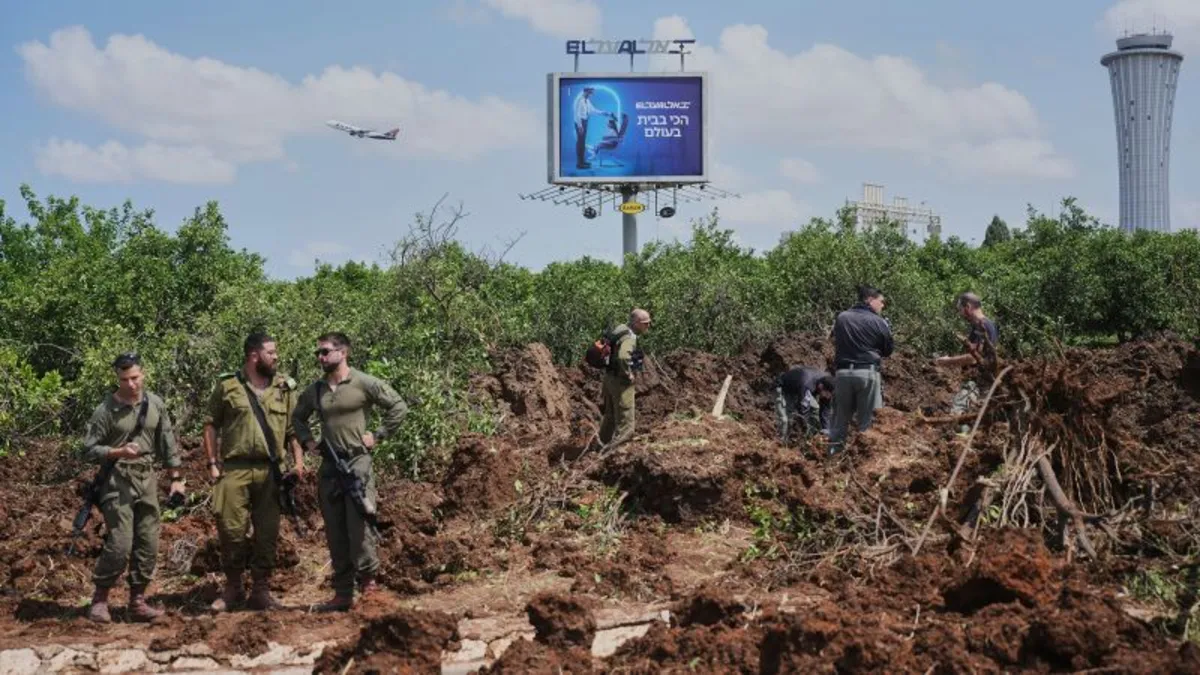
On Sunday, a failed interception of a missile fired from Yemen prompted Israel to temporarily shut down its main international airport, Ben Gurion Airport. This incident highlights the vulnerabilities within the country's defense systems and underscores the Houthi rebels' ongoing capability to target distant locations, despite an extensive U.S. military campaign aimed at mitigating such threats. The airport, located near Tel Aviv, halted flights for approximately 30 minutes after a missile landed near its vicinity, following multiple interception attempts by the Israeli military.
The Israel Defense Forces (IDF) reported that they had attempted to intercept the incoming missile using their long-range Arrow interceptor system. A spokesperson for the IDF confirmed the engagement, stating, “The results of the interception are under review.” In addition to Israel's defense systems, the U.S. has also deployed the advanced THAAD anti-missile system within the country to bolster its defenses.
The Houthi rebel group, which is backed by Iran, claimed responsibility for the missile attack, stating it was a response to what they termed "Israel’s crime of genocide" against the Palestinian people in Gaza. This attack marks a significant moment, as it appears to be the first successful targeting of Israel’s international airport by the Houthis. Yahya Saree, the spokesperson for the group, stated that the American and Israeli defense systems had failed to intercept the missile aimed at Ben Gurion Airport, which he described as a “hypersonic ballistic missile.”
Israeli Prime Minister Benjamin Netanyahu pledged further retaliation against the Houthis, emphasizing that Israel would take continued action in response to the attack. In a video address, he remarked, “We acted before, and we will act in the future too. The U.S., in coordination with us, is also operating against them. It’s not ‘one and done’ - but there will be hits.” Defense Minister Israel Katz warned of a “sevenfold” response. Following the incident, Israel’s security cabinet was scheduled to convene to discuss the implications of the attack.
This incident represents a significant security breach at one of the most heavily fortified sites in Israel, raising concerns about the country's ability to effectively intercept such missile threats despite its renowned missile defense system. In the aftermath, train services to and from the airport were suspended, and authorities advised the public to avoid the area. Images from the scene revealed debris scattered across the airport grounds, while a video circulating on social media depicted the missile's impact and the resulting plume of black smoke.
As a precautionary measure, several airlines, including Lufthansa, Swiss, Austrian Airlines, Brussels Airlines, and Eurowings, suspended their flights to and from Tel Aviv until after Tuesday, May 6, according to a spokesperson from the Lufthansa Group.
Military affairs analyst Amir Bar Shalom, speaking on Israel’s Army Radio, emphasized the need to take this missile threat seriously. He noted the remarkable accuracy of the missile, which was launched from approximately 2,000 kilometers away, suggesting a potential new kind of threat. Bar Shalom also pointed out that Iran is advancing in the development of long-range missiles capable of maneuvering to evade air defenses, although it remains uncertain if such technology has been passed on to the Houthis.
The military plans to thoroughly analyze the failed interception attempts, focusing on various factors, including when sensors detected the missile and the effectiveness of the interception systems. “There are so many parameters that may be relevant to the result that have to be analyzed,” Bar Shalom stated.
Since the onset of Israel's conflict with Hamas in Gaza in October 2023, the country has faced missile and rocket attacks not only from the Houthis in Yemen but also from Hezbollah in Lebanon. Although the majority of these projectiles have been successfully intercepted by Israel's air defenses, notable incidents have occurred. For instance, a Houthi missile struck Israel’s commercial capital, Tel Aviv, in December after a failed interception, resulting in multiple injuries.
Moreover, the Houthis claimed responsibility for a drone attack in Tel Aviv earlier in July, marking the first such incident involving the group targeting the city. In response, Israel has conducted several strikes against Houthi positions in Yemen, targeting infrastructure such as power plants and maritime ports. The U.S. military has also intensified its operations against the Houthis, focusing on diminishing their capabilities to disrupt shipping in the Red Sea and to target Israel and U.S. vessels in the region.
Despite the ongoing U.S. military efforts, which have reportedly cost close to $1 billion in a matter of weeks, including the deployment of advanced weaponry, the Houthis' ability to launch ballistic missiles against Israel remains largely intact. While Israel's missile defense systems have successfully intercepted most attacks, the recent events underscore the growing complexity and challenges facing the nation's security landscape.